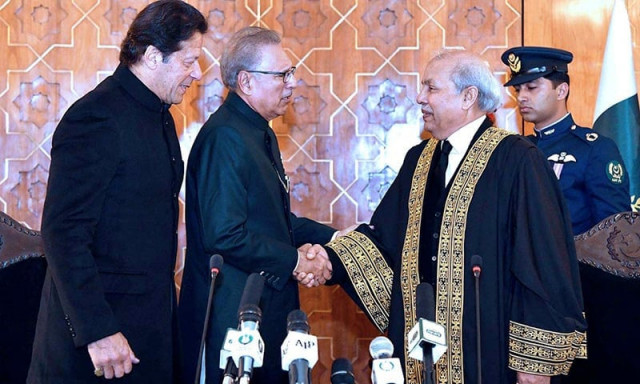Judicial restraint and outgoing CJP’s swansong
Bench also grilled the prime minister over the ongoing talks with the TTP

The extraordinary sequence of events in the country’s top court last month has seemingly thrown the establishment’s relations with the former into a new period of uncertainty and seeded confusion about its outcome.
However, confronted with, as it were, a toxic brew of political brinkmanship and questions about its independence, the Supreme Court’s newfound focus on the hitherto ‘forbidden’ subjects is being viewed as an attempt to counter the narrative that calls into question its “selective judicial activism”.
The court is studiously miming to the “boundaries” and holding its tongue, goes the accusation, and shows noticeable restraint when it comes to the “pet peeves” of the powerful establishment.
For decades, this has been the common wisdom in certain sections about the apex court, which has earned the blame for weakening democracy by bestowing legal legitimacy on Bonapartist commanders and ousting elected prime ministers allegedly on the establishment’s desire.
On the other hand, the political parties have dragged the judiciary further into the political thicket by using higher courts for technical knockout of their opponents during the last decade.
All manner of speculation surfaced in the meanwhile about the possible rupture between the judiciary and the establishment when the former flexed its muscle and summoned Prime Minister Imran Khan on November 10 over the government’s failure in taking action against the then top security officials over the December 16, 2014 attack on the Army Public School (APS).
During the hearing, the bench grilled the prime minister over the ongoing talks with the Tehreek-e-Taliban Pakistan (TTP) and wondered that those in charge of the security at that time were now enjoying their lives after receiving “guard of honour and other perks and privileges” upon retirement.
When Justice Gulzar Ahmed took oath as the Chief Justice of Pakistan in Dec 2019, there appeared to be strain in the judiciary-establishment relations due to some judgments, especially on the COAS’s extension. The establishment got relief in the end, though. However, on the Justice Qazi Faez Isa issue, most judges threw their weight behind him.
The chief justice ordered the federal government to take action against those who showed negligence in the APS tragedy and gave a period of one month to proceed in the matter in view of the statements of parents of deceased children.
Read More: The mixed legacy of CJP Nisar
Similarly, the pressure on the judges intensified manifold after the release of alleged audio of former CJP Saqib Nisar, feeding the notion that it is in cahoots with the security establishment to engineer the political realm.
The predicament got all the more pronounced on November 20, when CJP Gulzar vehemently denied that the judiciary was being influenced by, or taking dictation from, other institutions.
“Neither I have taken dictation from anyone nor anyone has ever dared to dictate me,” the chief justice said, rejecting the fiery assertion of former SCBA president Ali Ahmad Kurd that the judiciary was under pressure from the powers that be.
Last week, an apex court bench initiated proceedings regarding the implementation of its two-year-old order about ending commercial activities on land which was being taken for defence purposes.
The court regretted that commercial use of the cantonment lands was a matter of “embarrassment” for both the judiciary and the military. It also rejected the defence secretary’s reply in this matter.
Likewise, another bench of the apex court granted bail to lawmaker Ali Wazir in a hate speech case, a matter that had been pending since June.
The top court is also resuming the hearing of sacked Islamabad High Court (IHC) judge Shaukat Aziz Siddiqui’s petition against his removal, on December 6. The matter holds a great deal of significance for the establishment.
A mere swansong?
Several hypotheses are doing the rounds as to what is driving the winds of change blowing in the superior judiciary.
Some lawyers have chalked it up to the traditional pattern in the judiciary, pointing out that almost every chief justice in the country’s history preserves such tokenised rebukes for the executive, especially the establishment, for the period immediately preceding their retirement.
The incumbent CJP is retiring in February next year.
Senior lawyers say that November’s unprecedented proceedings are reflective of the apex court’s desperate attempts to combat the perception that the judiciary has been carrying a ‘soft corner’ for the establishment since Panamagate proceedings.
However, they believe that despite these remarks, there is little chance that the Supreme Court will pass any coercive and substantial order that rocks the boat and violates the power dynamics of the establishment.
The implementation of a verdict against them, they argue, has been rendered almost impossible since many judgments related to security establishment have not been implemented so far.



















COMMENTS
Comments are moderated and generally will be posted if they are on-topic and not abusive.
For more information, please see our Comments FAQ